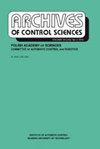Maximizing performance of linear model predictive control of glycemia for T1DM subjects
IF 1.1
4区 计算机科学
Q4 AUTOMATION & CONTROL SYSTEMS
引用次数: 4
Abstract
The primary objective of this paper is the custom design of an effective, yet relatively easy-to-implement, predictive control algorithm to maintain normoglycemia in patients with type 1 diabetes. The proposed patient-tailorable empirical model featuring the separated feedback dynamics to model the effect of insulin administration and carbohydrate intake was proven to be suitable for the synthesis of a high-performance predictive control algorithm for artificial pancreas. Within the introduced linear model predictive control law, the constraints were applied to the manipulated variable in order to reflect the technical limitations of insulin pumps and the typical nonnegative nature of the insulin administration. Similarly, inequalities constraints for the controlled variable were also assumed while anticipating suppression of hypoglycemia states during the automated insulin treatment. However, the problem of control infeasibility has emerged, especially if one uses too tight constraints of the manipulated and the controlled variable concurrently. To this end, exploiting the Farkas lemma, it was possible to formulate the helper linear programming problem based on the solution of which this infeasibility could be identified and the optimality of the control could be restored by adapting the constraints. This adaptation of constraints is asymmetrical, thus one can force to fully avoid hypoglycemia at the expense of mild hyperglycemia. Finally, a series of comprehensive in-silico experiments were carried out to validate the presented control algorithm and the proposed improvements. These simulations also addressed the control robustness in terms of the intersubject variability and the meal announcements uncertainty.最大化线性模型预测控制T1DM受试者血糖的性能
本文的主要目标是定制设计一种有效且相对易于实现的预测控制算法,以维持1型糖尿病患者的正常血糖。所提出的针对患者的经验模型采用分离的反馈动力学来模拟胰岛素给药和碳水化合物摄入的影响,被证明适合于合成一种高性能的人工胰腺预测控制算法。在引入的线性模型预测控制律中,将约束应用于被操纵变量,以反映胰岛素泵的技术局限性和胰岛素给药的典型非负性。同样,在预测自动胰岛素治疗期间低血糖状态的抑制时,也假设了控制变量的不等式约束。然而,控制不可行性的问题已经出现,特别是当被控变量和被控变量同时使用过于严格的约束时。为此,利用Farkas引理,可以制定辅助线性规划问题,该问题的解可以识别这种不可行性,并通过适应约束恢复控制的最优性。这种对约束条件的适应是不对称的,因此可以以轻度高血糖为代价强迫完全避免低血糖。最后,进行了一系列全面的计算机实验来验证所提出的控制算法和所提出的改进。这些模拟还在受试者间可变性和用餐通知不确定性方面解决了控制稳健性。
本文章由计算机程序翻译,如有差异,请以英文原文为准。
求助全文
约1分钟内获得全文
求助全文
来源期刊

Archives of Control Sciences
Mathematics-Modeling and Simulation
CiteScore
2.40
自引率
33.30%
发文量
0
审稿时长
14 weeks
期刊介绍:
Archives of Control Sciences welcomes for consideration papers on topics of significance in broadly understood control science and related areas, including: basic control theory, optimal control, optimization methods, control of complex systems, mathematical modeling of dynamic and control systems, expert and decision support systems and diverse methods of knowledge modelling and representing uncertainty (by stochastic, set-valued, fuzzy or rough set methods, etc.), robotics and flexible manufacturing systems. Related areas that are covered include information technology, parallel and distributed computations, neural networks and mathematical biomedicine, mathematical economics, applied game theory, financial engineering, business informatics and other similar fields.
 求助内容:
求助内容: 应助结果提醒方式:
应助结果提醒方式:


